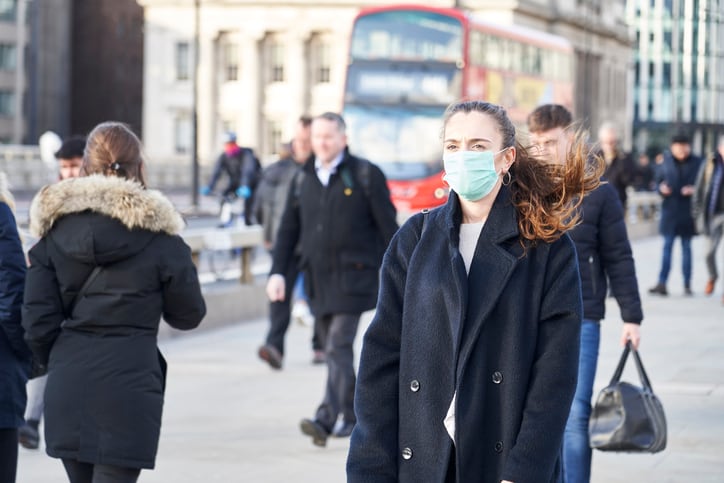Today, England faced a second business day in another lockdown implemented because of rising COVID-19 cases in the country. The latest nationwide lockdown, announced by PM Boris Johnson on January 4, 2021, was set to last for at least six weeks, though government had made clear it could last longer.
Scotland, Wales and Northern Ireland were also already in nationwide lockdowns, each likely to be in place until at least the end of this month, with certain stricter measures added recently like stay-at-home orders.
CosmeticsDesign-Europe caught up with Dr. Emma Meredith, director-general of the UK’s Cosmetic, Toiletry and Perfumery Association (CTPA) and Millie Kendall MBE, CEO of the British Beauty Council, to find out how these latest restrictions might impact beauty businesses.
Beauty impact – ‘January is often a busy month’ for retail, services to be hit hard
“We know the latest lockdowns will be challenging for the cosmetics and personal care industry across the UK,” Meredith said.
“While the golden quarter for so many businesses was affected by restrictions in the run-up to Christmas, January is often a busy month for retailers in particular.”
The closure of non-essential retail, along with spas and hair, beauty and nail salons would therefore see “many businesses affected”, she said. This would especially be the case for beauty services, that not only had to shutter salon doors but also had to stop any home services, she said.
Kendall agreed: “I think beauty services are the ones that are challenged the most.”
Given beauty services were appointment-based, one-on-one, labour-intensive operations that couldn’t transition online, Kendall said lockdowns were “incredibly difficult” for these businesses.
‘Timely and tailored’ government support required, ideally sector-specific
Following the latest England-wide lockdown, the Treasury had committed to new support packages for UK businesses, offering one-off grants of up to €9,900 (£9,000) to companies classified as retail, hospitality and leisure.
Meredith said the CTPA welcomed the government’s recent support package commitments.
“Timely and tailored government support will be essential for many businesses to ensure they can survive this new lockdown. This is especially important for businesses such as close-contact personal services, which have no option to operate remotely,” she said.
Kendall, however, said these grants were too broad-brush; categorising every type of beauty company as ‘retail’.
“Pre-Christmas [the British Beauty Council] had already prepared a document for the Treasury; an evidence document that outlined the fixed costs for hair and beauty businesses, with some pretty robust arguments for why we should have sector-specific support financially. The problem has been this all the way through – although we now have our sector-specific title which is ‘personal care’, we come under non-essential retail. And the problem with that is, we don’t operate like a shop.”
Kendall said beauty companies required more specific financial support that considered operational setups, supply chains and “very high overheads” for the most part.
“This isn’t just about hair and beauty salons and freelancers; this has an impact on the supply chain – it’s our whole ecosystem. And I think the government has overlooked that.”
She said the British Beauty Council would continue its advocacy work for industry at government-level, working to get beauty differentiated from retail and championing the importance of the sector’s individual merits.
Meredith agreed: “As the voice of industry, the CTPA will continue to advocate on behalf of the industry and consumers to ensure businesses are supported, explaining to regulators that our products and services are essential for daily life.”
Trade association support to prove ‘critical’ ahead
Meredith said the CTPA would also ensure it stayed present for its industry members as businesses navigated through another difficult period.
“In times of crisis, such as this, trade associations are critical in helping their members and their industries through the challenges. This is a very difficult time for us all. CTPA can help with practical advice and support,” she said.
The association would help its members by highlighting new requirements and restrictions; sign-posting the government aid that was available; and addressing specific questions companies had relating to new ways of operating. The association was also primed to assist with any supply chain issues, “should the situation arise where there are shortages of ingredients and components to manufacture critical products”, Meredith said.
The CTPA’s Covid Emergency Response Exchange (CERE) portal – launched back in April 2020 during the first nationwide COVID-19 lockdowns – was available to industry, working to match suppliers, manufacturers and other businesses to help plug any shortages of supplies or services for critical hygiene products, as well as facilitate the supply of PPE for those on the front line.
Meredith said once lockdowns were over and it was safe to open as an industry, the CTPA would continue its work building consumer confidence around in-store shopping and salon and spa visits and continue to advocate for regulators to recognise cosmetic and personal care products as “essential for daily life”.
Kendall said it would be vital all industry members collaborated in the longer-term push to get beauty recognised by government as an industry with very specific needs. “We have to really work together to approach our local MPs. The more that we approach our local MPs and shout about the injustice, the more focused it will get in parliament. It’s not just us, our organisation, that has to be talking to politicians (…) It has to be global corporations, small brands, beauty salon owners, freelance hairdressers – it has to be everyone.”




